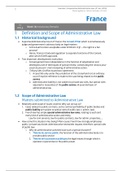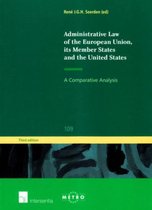Seerden, Comparative Administrative Law (4th ed., 2018)
1 Made legible by Tahrim Ramdjan (19 Oct)
France
For
PPLE Week 1A Introductory Remarks
1 Definition and Scope of Administrative Law
1.1 Historical background
• Supreme Administrative Court of France: the Conseil d’Etat which is simultaneously
judge and government’s advisory body on legal matters
o Is this dual function acceptable under ECHR Art. 6 §1 – the right to a fair
process?
o Hence, France introduced regulation to separate functions of the Conseil,
after which ECtHR approved.
• Two important developments took place.
o Conseil gained more independence in the function of adjudication and
developed a set of techniques of judicial review, constituting the recours pour
excés de pouvoir : main reviewing of administrative action.
o Tribunal des Conflicts issued two statements:
1. A case falls only under the jurisdiction of the Conseil and not an ordinary
court if explicit reference is made to the case being related to the public
service
2. Administrative liability is not subject to private law rules, but special rules
adjusted to necessities of the public service à essential basis of
administrative law
1.2 Scope of Administrative Law
Matters submitted to Administrative Law
• Relatively wide scope of issues covered. Why can we say so?
1. Cases related to public contracts, extra-contractual liability of public bodies and
public liability are subject to special rules of public law (= admin. law).
2. French law has ample special administrative law rules, relating to each and
every kind of administrative action and entity.
Law for civil servants, law for public contracts, law for admin. properties, …
• How come this situation into being? Main cause: French law strongly emphasises
public / private law divide. Administrative necessities request, therefore, special rules
of public law.
o Why do administrative activities have such a special character?
1. Théorie du service public: the function of the administrative body is to
provide public service
2. Théorie de la puissance publique: the legal means through which it
operates is special due to the public power
, Seerden, Comparative Administrative Law (4th ed., 2018)
2 Made legible by Tahrim Ramdjan (19 Oct)
2 Legal design of the administration
2.1 Public legal persons and public organs
• The administration is composed of specific legal persons, who are called public
persons or public law legal persons.
o This includes private entities entrusted with public tasks, with responsibility
of a public person.
o Usualy, whether a legal person is public or private is stated in its founding
acts.
• Most public legal persons fit into three categories:
1. The State
2. Local entities
3. ‘Public establishments’: entities with public functions alongside State or local
public persons
• Public persons are represented in their activities by organs, who issue legal acts on
their behalf. They belong to two categories:
1. Individual: a Minister, a Mayor, etc.
2. Assemblies: e.g. a council in a local entity
2.2 Legal arrangement of the State
• Government (PM) and President have to agree on prominent decisions: main
regulatory acts, appointment of top civil servants.
• Large administrative powers now entrusted to quango’s (quasi-autonomous non-
governmental organisations, Autorités administratives indépendantes).
• The State’s legal pattern includes quite important local, decentralised organs.
o Their competence is then limited to the administrative area where they are
situated.
o Local state organs are the préfets, established in regions and departments
and appointed by the Government. Hierarchical control is exercised over
them, but the préfets also enjoy extensive power.
2.3 Local government
• Legal bases for decentralisation:
1. Local entities, collectiivies locales, are considered legal persons.
2. Large degree of autonomy assured to local entities on constitutional basis.
• What is the structure of local decentralised administration?
Regions à départements à communes (about 35,000!)
o Communes are responsible for quite important tasks such as water and power
distribution. This has forced them to co-operate and organise themselves.
Effect is that de facto these co-operations are in charge of administration, not
the communes themselves.
• State has a large range of methods for intervention: sometimes State authorities
need to take a decision, or fund a local decision.
o Furthermore, the State-chosen préfets oversee legality of decisions of local
entities.
, Seerden, Comparative Administrative Law (4th ed., 2018)
3 Made legible by Tahrim Ramdjan (19 Oct)
For
PPLE Week 2B Tools of Government
3 Substance of Administrative Powers.
Administrative Acts
3.1 Public Powers
• The specific legal competences of the administration are called the prerogatives de
puissance publique.
o Of which the most important is the ability to unilaterally take decisions.
o It differs per administrative organ how wide the scope is of the unilateral
decisions that they can take, however, all heads of all administrative bodies
can issue unilateral decisions regarding the organisation of their bodies
• In 2015, the Code Relations between the Public and Administration issued to
codify all special acts. It clarifies procedural requirements concerning unilateral
administrative acts.
o Some decisions must be preceded by a fair hearing, except in emergency or
particular circumstances.
o Some decisions must be reasoned, so they must be expressed. It is analogous
to the decisions that require fair hearing, and concerns negative decisions
(that impose restrictions or sanctions on freedoms or fundamental rights).
o In many situations, administrative authorities must consult other authorities.
Sometimes, public debate or environmental assessment is required.
o Lex silencio positivo: silence of the administration for 2 month is acceptance.
• When can the administrative act be revoked (or modified)?
o Is it an individual or regulatory decision? Regulatory ones are more easily
revoked.
§ If regulatory:
1. Regulation must not be revoked from the outset unless it is
unlawful and this is within 4 moths
2. Regulation can always be revoked in the future
3. Regulation must be abrogated when it is unlawful and the author
has been asked to abrogate it
If individual:
1. If decision is lawful, may only be revoked if statute allows it
2. If decision is illegal, it can be revoked within 4 months
o Is it revoked from the outset (retrait) or for the future (abrogration)? For the
future, a decision can always be revoked.
o Is the decision lawful or unlawful? Unlawful decisions are more easily
revoked.
o Does the decision confer rights or not? If not, then it is more easily to be
revoked.
§ Two guidelines as to whether a decision confers rights:
1) Regulatory acts never confer rights
2) Individual decisions confer rights, but not specific kinds: pure
recognitive decisions, such as pecuniary decisions (wage
determination)
, Seerden, Comparative Administrative Law (4th ed., 2018)
4 Made legible by Tahrim Ramdjan (19 Oct)
• In general, French law gives the same status to individual decisions and regulatory
decisions, although specific rules apply to the one or the other.
o How to distinguish, is that a decision that addresses no precise person, then it
is regulatory.
o The main holder of regulatory competence is the Prime Minister. Ministers
may also be entrusted with such competence on particular issues. Sometimes,
regulations of heads of administrative bodies may also impose obligations
upon citizens.
• Note that administrative action is not constantly based on rules that confer legal
superiority on the administration.
o Often, none of the special rights is used in course of action, because it is not
necessary.
o Even the power of unilaterally acting is replaced with contracting sometimes.
o The administration is in many aspects of its functioning subject to special
restrains as well.
3.2 Enforcement
• Administrative decisions automatically produce effects in the legal order and thus are
directly enforceable. If one refuses to abide by an administrative decision, the
administration has recourse to three measures:
o Penal proceedings. If one acts contrary to a police act, the administration
may start prosecution for a fine or prison sentence. Criminal (NOT
administrative) courts decide whether the administrative act was lawful or
not.
o Administrative sanctions. Reprimand, banning of activity or financial
sanctions may be inflicted by administrative authorities invested with these
powers specifically. However the sanctions must be:
1. Justified and pronounced after due hearing;
2. Adhering to principle of impartiality;
3. Must be likely to be referred to courts – the judge can for instance
change the amount of sanction if he deems it disproportionate.
o Forced execution. Only when:
1. No other judicial way is opened
2. The law itself allows for it
3. When in case of emergency
• The administrative decision however must be lawful, and the administration must
remain liable in case the decision is enforced unlawfully. In case the unlawfulness is
very serious, this becomes a voie de fait and then judiciary courts become
competent.
For
PPLE Week 4A Division public/private law
3.3 Administrative Contracts
• Administrative bodies are not permitted conclude contracts on any possible matter,
especially in administrative police.






